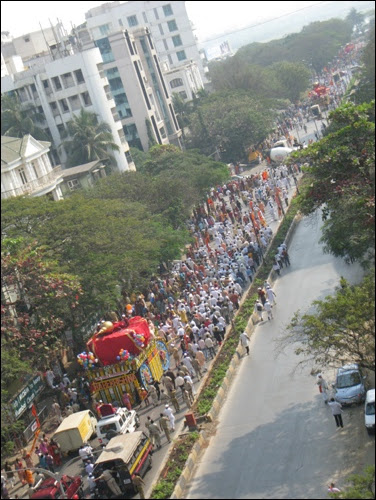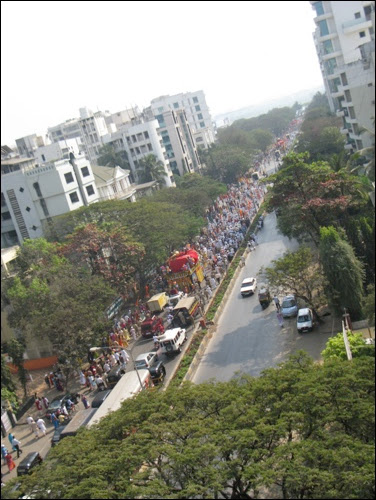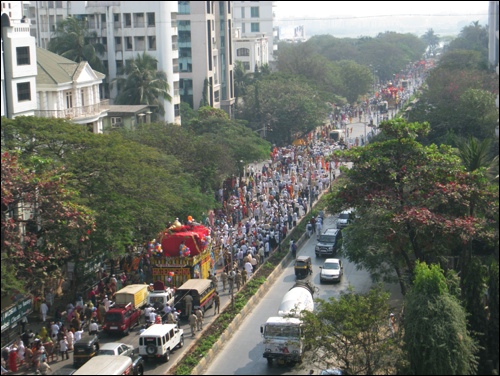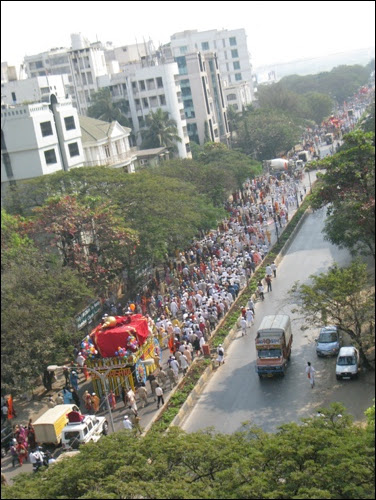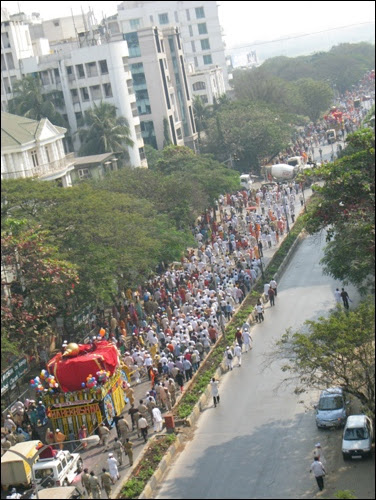Prabhupada:The Mayavada is a very dangerous philosophy. It has made the whole world atheistic. Hare Krsna. Jaya. Mayavadam asac-chastram pracchanam bauddham ucyate. They cannot understand that this is a dangerous philosophy.Yasomatinandana: He comes to the mangala arati, but then he says that you don't have to worship Krsna.
Prabhupada: Eh?
Yasomatinandana: He comes to mangala arati, but he says to us that "You don't have to go to worship Krsna in the temple."
Prabhupada: But we haven't got to learn from you. We have got better teacher than you.
Yasomatinandana: I told him like that.
Prabhupada: (chants japa) [break]. They'll talk of Krsna, so many things but they're not devotees. Just like Kamsa. They may talk of Krsna or think of Krsna, but they don't accept Krsna as the Supreme. Therefore they are demons. This is the test. They'll read Bhagavad-gita, but they'll not accept Krsna as the Supreme. And that is the demonic. mayayapahrta-jnana asurim bhavam asritah. Because they are demons, therefore their so-called knowledge is useless. Apahrta-jnana. And apparently, they seem to be very learned scholar, but there is no knowledge. There is no knowledge. This is the demonic... Just like Ravana. He was very much advanced student in Vedic literature. But he was a demon. So simply by studying Vedas one does not become out of the jurisdiction of demons. Just like Jarasandha. He was also worshiping Visnu. But he was a demon. He was a demon. His purpose was different. The yajnic brahmanas, they also could not understand Krsna. So this is the crucial test. If one does not understand Krsna and become submissive to surrender, he remains a demon, however big scholar he may be.
Indian (1): That is a division of sastra, Patel and Parsees.
Prabhupada: No, no. Don't mention anyone. This is the general definition.
Indian (1): They were saying that you are not speaking Vedas.
Prabhupada: What do they know about Vedas? If they did know, then they should have stuck up in family life, in kupa-mandukya and grhambhara, they have. They do not know what is Vedas. Vedais ca sarvair aham eva vedyah [Bg. 15.15]. Vedas means to understand Krsna. That is knowledge of Veda. In the Bhagavad-gita.
Yasomatinandana: That is the special quality of Kali-yuga, that sudra class people will take up the preaching of Vedas.
Prabhupada: Yes. And even followers of Sankaracarya... Sankaracarya does not give anyone any recognition unless he's a sannyasi. That is the strict principle of Sankara sampradaya. They are grhamedhis and they are thinking they are advanced in spiritual consciousness. Sankaracarya does not give anyone any position unless he is in the renounced order of life.
Giriraja: [break] ...sign of a great devotee is also to be always absorbed in...
Prabhupada: Yes. Therefore in their sampradaya it is a custom, as soon as he takes sannyasa, he becomes Narayana. "Namo narayana." (laughs) That is an allurement. So this... Even one says that he is follower of Sankaracarya, but there is no meaning in it. Unless one is a sannyasi, he cannot say that he is follower of Sankaracarya. Sankaracarya took sannyasa at the age of eight years.
Indian (1): He died about thirty-nine.
Prabhupada: Yes. Thirty-two. [break] ...never think what is the truth of life. Everyone. So somebody is taking sense gratification as truth of life. Somebody is taking mental speculation as truth of life. So many ways. But Bhagavata says, satyam param dhimahi [SB 1.1.1]. We worship the Supreme Truth. Namo bhagavate vasudevaya. The Supreme Truth. [break] ...say Brahma, om. Not Rama, Krsna. No, they'll never say. Sometimes they say, "Narayana." That is, means thinking himself as Narayana. (laughter) Daridra-narayana, this narayana, that narayana, Swami Narayana.
Devotee: Then they want to serve Narayana.
Passerby: Jaya Ramji. Jaya Ramji. Jaya Ramji.
Prabhupada: Hare Krsna.
Devotee: Then they, then they take the philosophy, "I want to serve Narayana."
Prabhupada: "No, I want to become Narayana."
Devotee: Yes, then they want to serve themselves.
Prabhupada: Not "serve Narayana." "I want to become Narayana."
Devotee: If they are Narayana, they serve themselves. So then they serve Narayana.
Indian (1): (Hindi)
Prabhupada: (Hindi) [break] There you see the Sarasvati. Sarasvati, she asks anybody, "Do you know Krsna?" He will say, "No, I do not know..." "The Supreme Personality of Godhead." (laughter) She... That is preaching. And she'll collect some money and bring it to me. From the very childhood. [break] ...evasam agre. That is stated in the Srimad-Bhagavatam. "And when everything will be finished, I'll stay." That is Krsna. Janmadyasya yatah. The Vedanta-sutra says that "He is the cause of creation, maintenance and annihilation." Brahma, Visnu, Mahesvara. [break] One who takes shelter of that birth, who is not interested in this distress and happiness, he also becomes of this Mad-bhava. That verse?
Devotee: Mad-bhava yanti mam.
Prabhupada: No, no. Vita-raga-bhaya-soka, mad-bhava upagamya. Bahu... What is that? I forget now, this... Vita... Yajna... Puta. Mad-bhavam adhigacchati. Mad-bhavam means by devotional service one attains the nature of Krsna, no more interested with the material distress and material happiness. That does not affect them. That is the... That is also stated in another place of Bhagavad-gita.
mam cavyabhicarini
bhakti-yogena yah sevate
sa gunan samatityaitan
brahma-bhuyaya kalpate
[Bg. 14.26]
He also becomes brahma-bhuta [SB 4.30.20]. Just like if you be in touch with the fire, then you become also warm. The quality of fire is warmth. So if you keep yourself always, constantly in touch with the fire, you also become warm. So this Krsna's qualification, that He's not affected by the material happiness and distress, can be attained by anyone who always keeps his association with Krsna. Is it clear?
Giriraja: Yes.
Prabhupada: Yes. [break] ...prasannatma. Brahma-bhuta. That is called brahma-bhuta stage. Na socati na kanksati. This happiness and distress is the cause of socati and kanksati. Kanksati means desiring to have something. This is distress. And lamenting for something, that is also distress. Actually, this is the material position. When we haven't got the things, we desire it. That is also distress. And when it is lost, that is also distress. But by illusion, they take it. When they get it, they think that it is happiness. This is maya. Actually, to get the things, he has to undergo so much hard... A man is given credit... Suppose he was a poor man. He has now become multi-millionaire. He is given credit. But he does not see that he has simply passed through distress. But he... By illusion, he's thinking that he's happy. He's also thinking, and others also thinking, that "He has become happy." But actually it is distress. Hare Krsna. (chants japa) [break] ...people become religious not for attaining the transcendental stage, but for material benefit, dharma, the artha. Artha means material opulence, that. They... These four things: dharma artha kama moksa [SB 4.8.41, Cc. Adi 1.90]. And why they want artha? To satisfy their senses. Dharma artha kama... And when they're again baffled, they want mukti, to become one with the Supreme. These are the four different tastes of the material. All, all of them are baffling and illusory. The so-called religiosity with a view to get some material profit... That comes everywhere. Just (as) in Christianity, the religion means, "O God, give us our daily bread." Material profit, similarly, in anywhere, they go for material benefit. Therefore this kind of religion, it is also good, but it not first-class. The first-class religion is sa vai pumsam paro dharmo yato bhaktir adhoksaje [SB 1.2.6], when one is awakened to the devotional service of the Lord, ahaituki apratihata, without any cause, and without being impeded. So ahaituki apratihata... That is, that stage is required. Not that "My sense gratification is not done here. Oh, let us give up this company." That is sense gratification. (laughs)
Giriraja: (reading from Krsna Book) "According to the different associations in the three modes of material nature, the living entities are tasting different kinds of religiosity..." [break] "...kinds of..."
Prabhupada: That religiosity also different kinds: rajasic, tamasic, and sattvic, according to one's nature. The sattvic, they worship Visnu. The rajasic, they worship the demigods. And the tamasic, they worship bhuta, preta, pisaca...
Devotee: Demons.
Prabhupada: Demons. You'll see the Mohammedans, they worship the tomb. And Christian also, they worship the tomb. They offer wreath on the tomb. So tamasic. What is there in the tomb? But because they're tamasic, they're worshiping like that. And this, this so-called incarnation worship is also tamasic. By tamasic, in darkness they accept somebody as incarnation, and they worship. This is tamasic.
Devotee: Srila Prabhupada?
Prabhupada: Yes.
Devotee: If someone said to us that "You are worshiping samadhi," what is the answer?
Prabhupada: Samadhi, we are offering respect to the acaryas. Yes. Not that we are simply worshiping samadhi. We are worshiping Krsna also, side by side. It is not that... Then samadhi worship is finished. That is acarya. Acarya is, although worshiped as the Supreme Lord, but the Lord is also worshiped. And these Mayavadis, they give up the worship of Lord. So therefore they are Mayavadis. In Mayavadi temple you'll find the picture of the guru and not the picture of Krsna. I have seen in Surat, one temple of "Rama." There is no Rama. Guru is Rama. That's all. Guru brahma, (Hindi) [break] ...caittya-guru, because he has merged into the existence of Lord, he has become Lord. "Merging-Lord. Daridra-narayana, merging-narayana." This is...
Devotee: The Jains have the same kind of philosophy also.
Prabhupada: Everyone. All philosophies, they are more or less Mayavada. All Mayavada. Different types of Mayavada philosophy. Therefore they should be discarded. Hare Krsna. Thank you very much. What you are, all students?
Students: Yes. (indistinct)
Prabhupada: Eh?
Student: (indistinct)
Prabhupada: You have seen our temple?
Student: Not seen your temple.
Prabhupada: So? You are not interested in Krsna philosophy?
Indian man (2): That's right. They are very interested.
Prabhupada: The... Every young boy, or even young child... Kaumara acaret prajno dharman bhagavatan iha [SB 7.6.1]. And that is the instruction of Prahlada Maharaja. He was a five years old child, and he was teaching his class friends Krsna consciousness. So in that teaching he said... The other children, they said, "Why you are teaching this Krsna consciousness? Let us play." So he answered, "No, no, my dear friends." Kaumara acaret prajno dharman bhagavatan iha. This science, Bhagavad-dharma, should be learned from the very beginning of life. That is Vedic culture. Brahmacaris, they were living at the place of guru and learning this science. That is Vedic culture. [break] ...boys of Europe and America, they are accepting this Vedic culture. Why you are keeping aloof? What is the reason?
Indian man (2): They are praying, but not showing.
Prabhupada: I do not follow.
Satsvarupa: They are praying, but not showing.
Prabhupada: Oh. So they are showing only?
Indian man (2): No, no, no. It is not only showing.
Prabhupada: Yes.
Indian man (2): That means "We pray at home."
Prabhupada: Pray at home?
Indian man (2): Yeah.
Prabhupada: Secretly?
Indian man (2): Not secretly. Just before others.
Prabhupada: Hm. That's all right. If you are praying, it is all right. But our proposal is that you have to understand the science. Prayer is very good, but if one offers prayer after knowing the science, that is very good.
Indian man (2): So we are also giving the knowledge about the science, science of Krsna philosophy.
Satsvarupa: We...?
Devotee: Are we giving the knowledge?
Devotee (2): Giving knowledge about science.
Prabhupada: Oh.
Yasomatinandana: He means material science.
Prabhupada: Material science? No, no, I am talking of Krsna science.
Indian man (2): About the existence of God?
Prabhupada: Not only existence. What is God, first of all. He must exist. Otherwise, where there is question of "What is God?" So what is the nature of God, what is our position, what is our relationship with God, what is our duty, and what is the goal of life, these things are very thoroughly discussed in Bhagavad-gita. So if we understand Bhagavad-gita very nicely, then we understand the whole science of God. Hare Krsna. [break] ...that Krsna comes, descends personally, to settle up the contention whether God is person or imperson. So even the Krsna's presence cannot convince these Mayavadis, poor fund of knowledge, that Krsna, the Supreme Lord is person.
Giriraja: (reading:) "Somehow people can understand the different incarnations of Your Lordship, but they are puzzled to understand the eternal form of Krsna with two hands, moving among human beings exactly like one of them."
Prabhupada: [break] ...them, the form is meant for killing them, chastising them. Therefore dangerous. Paritranaya sadhunam vinasaya ca duskrtam [Bg. 4.8]. So for the nondevotees the form is very dangerous. Sada pasyanti yoginah. Yogis, they concentrate their mind on the lotus feet of Krsna. That is real yoga. [break] ...boat, he crossed over.
samasrita ye pada-pallava-plavam
mahat-padam punya-yaso murareh
bhavambudhir vatsa-padam param padam
padam padam yad vipadam na tesam
[SB 10.14.58]
This is the process.
Mahamsa: This sloka is... Where is that sloka, Prabhupada?
Prabhupada: It is in the Tenth Canto. Bhavambudhir vatsa-padam. Just like this ocean, if it becomes a small pit, then don't require a big ship to cross over. You just... Like this. It can be reduced. By Krsna's desire, it can be done so. Just like at the present moment... Formerly, people used to go to London from India, from Bombay, at least, in fifteen days. Now it doesn't take even fifteen hours. It takes only nine hours. How it has been reduced? Because there is a process to reduce. Similarly, the supreme spiritual process is like that. It can be reduced to any quantity. Ani... This is called anima-siddhi. It can be expanded also, to the greatest length. Mahima-sakti. All-powerful means not that "I cannot do, I cannot, I can do this only." No, anything He can do. That is all powerful. Anima, laghima, mahima. Just like all these big, big planets, they are floating in the sky. This is called laghima, weightless, no weight. Those who are going to the moon planet, they are finding out weightlessness. How it has become weightless? Such a big, huge... Just this planet. With so many seas and mountains and cities and buildings. But it is floating. That's a fact. It is floating like a swab. How it is floating? You can say something nonsense, but the actual fact is this.
Mahamsa: You give the example in Nectar of Devotion...
Prabhupada: Yes.
Mahamsa: ...that when the..., dead bodies will sink in the water, but a live, when the body has life, it can float on water. So when Krsna enters...
Prabhupada: Yes, yes.
Mahamsa: ...impregnates...
Prabhupada: Yes.
Mahamsa: ...material nature, it can become weightless.
Prabhupada: Yes. A dead body immediately goes down in the water, but a living body floats. So this is the example, that because vistabhyaham idam krtsnam ekamsena sthita. Because Krsna enters this material world as Garbhodakasayi Visnu, as Ksirodakasayi Visnu, therefore it floats. Just like this airplane. It is floating so long the pilot is there. If the pilot is not there, it will not float, however good machine it may be. It will not float; it will come down. These are the ex... [break] ...soul, the spiritual spark, even in minute quantity, it can float the heaviest matter. This is the conclusion. [break] ...so high and if the pilot is killed some way or other, no more floating, come down.
Mahamsa: So this laghima siddhi is also being attained by the material scientists?
Prabhupada: Huh?
Mahamsa: This is also a siddhi, that they can invent a plane...?
Prabhupada: Yes. To some extent. By material arrangement... The yogis can do still more. Without any material machine, they can float. They can walk on the water, becomes light. [break] ...man-mana bhava mad-bhakto mad-yaji mam namaskuru [Bg. 18.65]. This is the process. [break] ...colleges, the students are being educated that there is no God. And they expect good behavior from them. And when they set fire in the bus, that is... "The students are so dangerous now." But you have made them dangerous. The educational system. They are protesting against the existence of God. [break] ...so-called swamis. And they are also accelerating, "yes, no more. There is no God. Why you are searching God anywhere? There are so many gods loitering in the street. They are God." That is the statement of Vivekananda. "Why you are finding out, trying to find out God elsewhere. These are Gods." [break] ...if required, one may come, very easily, one may take some time. But we should go on preaching.
Indian (3): No, exactly. We should not do anything...
Prabhupada: No. [break] ...American, rude. That is my experience. He may not agree with my philosophy. [break] ...the reason is that they are not poverty-stricken. Yes. When one becomes poverty-stricken, his all good qualities become null and void. Daridra-dosa guna-rasi nasi. Our country is now poverty-stricken. Therefore we have lost our all good qualities. [break] ...loss is that we have lost our culture, original Vedic culture. That is the greatest loss. When the culture was that one man was trying to kill one cow, and immediately Maharaja Pariksit wanted to take step against him. Now just see how much that culture has gone down. Here ten thousand, twelve thousand cows are being killed regularly under government management. You see. [break] ...for stopping cow-killing.
Indian (3): But even then they don't listen.
Prabhupada: No. Even Gandhi refused. Gandhi was approached by the... "Mahatmaji, you can stop this cow-killing." He replied, "How can I stop? It is their religion." Just see. [break] ...krsi go-raksya-vanijyam vaisya-karma svabhava-jam [Bg. 18.44]. This is the duty of the vaisyas.
Indian (3): Killing of the cow, there is no...
Prabhupada: Eh? [break] But who supplies the cow to us?
Indian (3): They are Hindus.
Prabhupada: They are Hindus. [break] ...travelling with a Mohammedan. At that time there was no Second Class, Inter Class or Second Class I was. So that Mohammedan gentleman, when he called for that food supply, so he was asking very... "Is there any meat, cow's flesh?" "No, no, sir. No, sir." "That's all right." (end)

 Público
Público